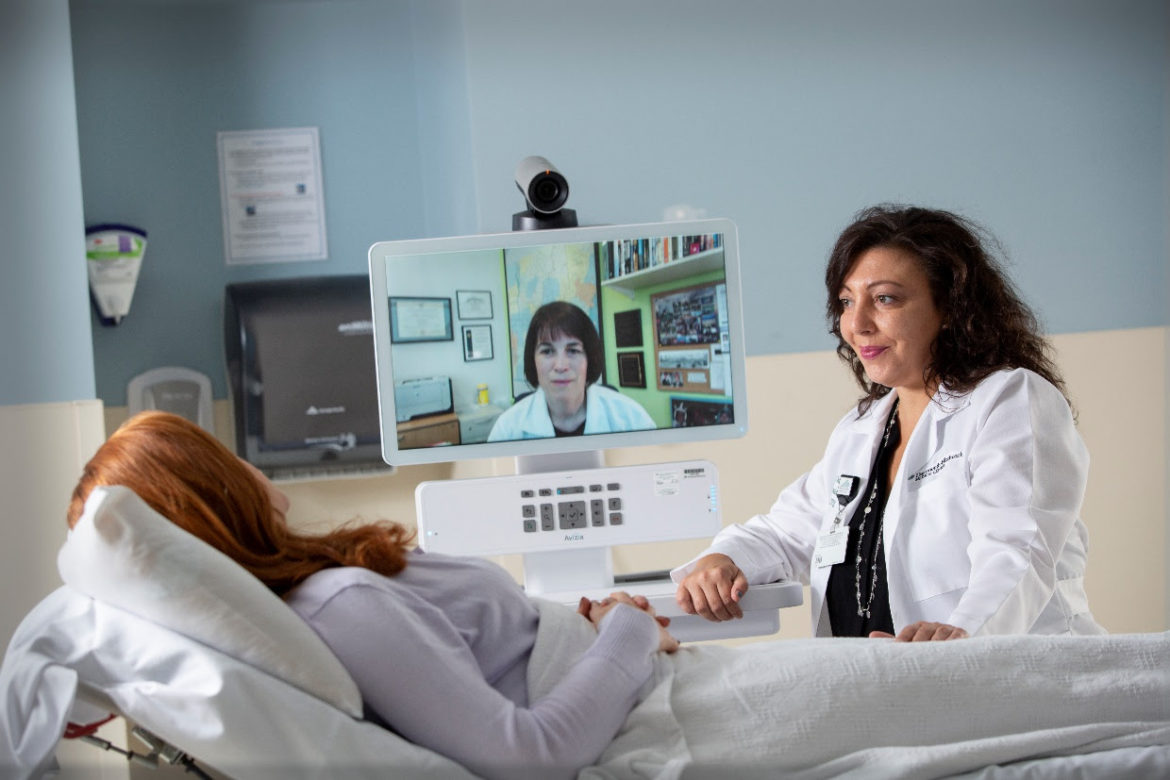Services complement local care and provide patients with prompt access to specialty care
Lebanon, NH – Valley Regional Hospital in Claremont, New Hampshire has partnered with Dartmouth Health Connected Care and Center for Telehealth to offer emergency neonatology (TeleICN), emergency psychiatry (TelePsychiatry) and emergency neurology (TeleNeurology) services to its patients via telemedicine. Valley Regional is one of 33 rural hospitals in New England currently partnering with Dartmouth Health Connected Care to provide patients with prompt access to specialty care that may not be available locally.
“This partnership is extremely important to us because it brings Dartmouth Health’s world-class care to our patients where they need it, and in real time as neonatal, psychiatric or neurological emergencies arise,” said Jocelyn Caple, MD, MBA, Interim President and CEO, Valley Regional Hospital. “Our providers also benefit from knowing that they have a collaborative partner at the bedside to care for more complex patients. It’s a win for everyone.”
The birth of a baby is a complex process and adjusting to life outside the mother’s body can sometimes require a higher level of care. Through TeleICN, Dartmouth Health neonatal specialists can provide 24/7 real-time assessment and treatment recommendations to the local team when patients in labor present to Valley Regional Hospital, which does not have a labor and delivery unit. TeleICN has been shown to reduce transfers, when appropriate, help to keep babies and their families closer to home.
Dartmouth Health’s TelePsychiatry service provides Valley Regional Hospital patients and clinicians 24/7 access to board-certified psychiatrists. The service supports and assists the local clinicians with assessing and treating patients in the emergency department (ED) or those admitted to the hospital who are experiencing psychiatric symptoms. Patients are evaluated, managed and treated in real-time collaboration with Valley Regional providers via telemedicine, allowing treatment to begin faster.
Dartmouth Health’s TeleNeurology service brings a neurologist to the patient’s bedside within minutes, supporting the Valley Regional Hospital clinical team with prompt assessment and treatment recommendations via telemedicine. Board-certified neurologists are available 24/7 for consultations on stroke and other neurologic emergencies, as well as for routine neurologic consultations among patients in the ED or inpatient setting.
At Valley Regional, specialized telehealth carts quickly connect the bedside care team with the
Dartmouth Health team, allowing Dartmouth Health clinicians to directly assist with patient evaluation and treatment.
“We are thrilled to add these three services to the telehealth collaboration that already exists between Dartmouth Health and Valley Regional,” said Kevin M. Curtis, MD, MS, Medical Director of Dartmouth Connected Care. “We look forward to continuing to work with their outstanding bedside teams to assist the providers, staff, and most importantly, patients, in whatever manner is needed.”
Hospitals and health systems across the country are facing increased pressures – from lack of beds and overcrowding, to changing reimbursement models and declining numbers of specialists. In rural communities, the shortage is especially acute. Telehealth services can help hospitals increase access to evidence-based care by providing their clinical teams with specialty support.
Dartmouth Health Connected Care was founded in 2012 with a primary objective of helping to deliver outstanding healthcare to the region independent of a patient’s physical location. Telehealth services are designed to drive accessible, efficient and effective care by complementing and enhancing existing programs and services provided in local communities. Dartmouth Health’s Connected Care telehealth program currently serves 33 hospitals in New Hampshire, Vermont, Maine, Massachusetts and New York, providing services such as TeleEmergency, TeleICU, TeleICN, TeleNeurology, TelePharmacy, TelePsychiatry, Outpatient Virtual Visits and Virtual Urgent Care.






